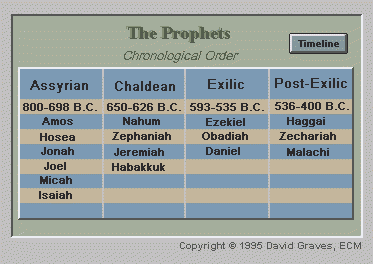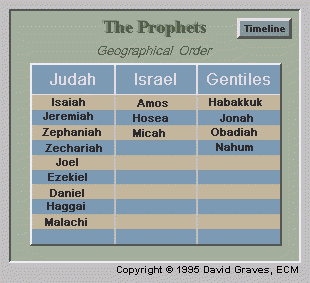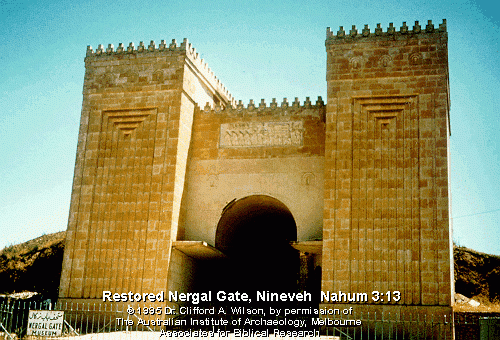Origin of Prophecy
'For whatsoever things were written aforetime were written for our learning, that we through patience and comfort of the scriptures might have hope.' Romans 15:4
'All scripture is given by inspiration of God, and is profitable' 2 Timothy 3:16
On Mount Sinai, God spoke directly to his chosen people, but this demonstration of majesty was so overwhelming that they asked God to speak only through Moses. Deuteronomy 5:27 Not long after this God comes to Israel with a beautiful Prophecy found in Deuteronomy 18:9-22. It warns the Israelites who are about to enter the promised land, against learning the abominable practices of the heathen nations. God's people will have no need to resort to such devices for God will Himself raise up for them a Prophet who will act as a mediator between themselves and God, and who will also speak to them all the words which God will place in his mouth.
Prophecy tells us two things. First that there was to be a body of Prophets, an institution which would declare the words that God commanded. Second there was to be a great prophet, who alone would be like Moses and might be compared with him. The Prophet that is referred to here is the Messiah.
Moses stood in special relationship to God as a prophet as we see from Numbers 12:1-8. Here is where he is like the Messiah. No one else but the Messiah could claim this close relationship to God. Deuteronomy 34:10 'And there arose not a prophet since in Israel like unto Moses, whom the Lord knew face to face.' So all that the prophets said was to be in accord with the work of Moses. so the Mosaic economy would continue until the time of preparation was to come to an end. Then in the fulness of time there would appear One like Moses, Who would declare God's word and will to His people, and of Whom it would be said, 'This is My beloved son, hear him.'
So we see from the Word of God that the Prophetic institution is of Divine origin. The institution of Prophecy was a gift of God's grace. God did not have to speak but he did. The Prophets were men raised up of God, in whose mouth God's word had been placed, and who spoke that word without compromise. They were to stand as a counterpart to the soothsaying and divination of Canaan, and to them Israel was to listen.
The New Testament agrees with this view. 2 Peter 1:21 'For the prophecy came not in old time by the will of man: but holy men of God spake as they were moved by the Holy Ghost.' The prophets however were not revelational robots. The Spirit of God neither obliterates their personalities nor renders them oblivious to the conditions around them. The prophets speak out of their own particular set of circumstances and in their own individual styles.
Prophetic Periods
Theocratic Period
From Israel's beginning as a nation to the age of Samuel--God ruled, so there was little need for prophetic succession. However from time to time God did raise up those who would declare the will of God to the People. Moses.
Non-writing Prophets
This was the period from Samuel to King Uzziah, approx. 800 BC. This was the era of the prophets of action. They were busy with the kings of Israel and Judah and left no writings.
- Elijah
- Elisha
- Nathan
Writing Prophets
Prophets in Chronological Order

From 800-400 B.C. there was the flowering of the age of Prophecy. They can be broken down into several divisions.
Prophets of Israel
Prophets of the Ten Tribes of Israel.
- Hosea
- Amos
Prophets of the Gentiles
- Jonah (Nineveh)
- Nahum (Nineveh)
- Obadiah (Edom)
Prophets of Judah
Culminating Period
The 100 years between Uzziah and Hezekiah. These prophecies are more joyful than the other prophetic writings. They are filled with Messianic prophecies and contain the light of the future. This period includes the prophets
- Joel
- Micah
- Isaiah
The Declining period
These prophets lived during the reign of the kings from Manasseh to Zedekiah Their pages describe evidences of the storm clouds gathering over Judah.
- Zephaniah
- Habakkuk
Captivity
Prophecies of mourning.
- Jeremiah
- Lamentations
The Exile
These Prophecies are futuristic in their scope.
- Ezekiel
- Daniel
The Restoration
- Haggai
- Zechariah
- Malachi
Preparation of a Prophet
Although most prophets lived in simplicity and poverty, and usually in some out of the way place, these men of God had much authority among the people and were highly esteemed by Godly rulers.
However when we refer to the prophets, we should remember some basic distinctions. Scripture separates true prophets from false. The false prophet is a windbag who has been given nothing to say, but says it most impressively.
The law provided the death penalty against false prophets who assumed the role of a divinely sent messenger. False prophets were to be recognized either from their attempt to introduce idolatrous worship or by their predictions that failed to come to pass. Deut. 13:1-11; 18:20-22 Despite the severity of this punishment, there were still unauthorised messengers giving their messages. However God would always vindicate his prophets by fulfilling their predictions and dealing with the false prophets. Jer. 28:15-17; 29:30-32
Most prophets received special training. The school of the prophets was first instituted by Samuel. 1 Samuel 19 tells us that It was located during the early years at Ramah 1 Samuel 19:19,20. Later schools were established at Bethel, Jericho, Gilgal, and elsewhere 2 Kings 2:3,5. The schools attracted student of the word who were given formal training in the law and its interpretation. They were lead by an elderly prophet called Master. This is where the term the sons of the prophets comes from. 1 Sam. 10:12; 2 Kings 2:3.
Now just like in our modern schools of theology not everyone who was enrolled in these schools possessed the gift of prophecy. Also it is like today not all inspired prophets were graduates of such schools. Amos, although called to be a prophet, was trained outside the prophetic schools of the day.
Classification of Prophets
Size
Historically the prophets have been grouped in several different ways. Sometimes they are classified by size as the Minor and the Major prophets. The Major prophets being the larger prophets, Isaiah and Jeremiah and the minor prophets being the remaining prophets.
Geographical

The Prophets can also be grouped by their geographical location. However while the Prophets spoke to a particular region or people they are often not confined to that area. Isaiah spoke to many nations including Egypt and Babylon. Jonah for example spoke to the Gentile city of Nineveh.

Chronological

However a useful way to look at them is Chronologically. They can be broken down into four periods. There is the Assyrian period when Israel was under Assyrian domination. While Israel was in captivity the prophets began to speak to Judah warning them of the same consequences for their sin. Then the Assyrians were overrun by the Babylonians or Chaldeans. Then when Judah was carried off into captivity by the Babylonians, the Prophets went with them and still spoke to God's people. This period is commonly called the Exilic period. After the captives returned home and during the building of the temple and Jerusalem walls the prophets spoke once more to encourage the people in their labours. This period commonly called the Post Exilic period.
Message of the Prophets
The writing prophets began to record their prophecies about 800 B.C. with Joel and Amos. The hearts of God's people were corrupt and sin abounded in the kingdoms of both Israel and Judah. God sent the prophets to warn God's people of the consequences of sin and disobedience. But their message was not wholly negative as is often assumed. They had a glorious positive message of the promise of restoration, covenant blessing and the coming of the Messiah. At least six periods of time were included in their predictions.
The prophets did not always understand what they were saying and writing. Daniel for example confesses this in 12:8. I heard, but I did understand not. Also in Zechariah 4:5. But the Prophets were not simply dictation machines they did interact with their messages and look into the meaning of their words. 1 Peter 1:10-12
Teaching of the Prophets
The prophet teach us alot about the nature and Attributes of God as well as about ourselves.
Sovereignty
They teach us about the Sovereignty of God. He is Sovereign over the Nations. Nothing is more central to the thinking of these prophets than the fact that God is the sovereign Lord of history and that nothing happens, either to Israel or to the gentile Nations that is not the result of His direct determination. The locust plague of Joel was His doing. The destruction of Nineveh was from Him. He rules supreme in the kingdoms of men, setting up one nation and putting down another, exalting one man and humbling another to the dust. Through it all, He rules supreme and He is working out His sovereign purpose. God is the potter. The nations are but vessels in His hand to make and remake as He wills. 'Behold, as clay is in the potters hand, so are ye in mine hand, O house of Israel. Jer. 18:6 He has absolute power to dispose of the nations as He will, though He leaves them room to repent. Each Prophet always presented the two ways. Serve God and you will live; Curse Me and you will dies. Repent and God will avert the evil; Reject me and I will cast you off. Jer. 7:1-15.
Faithfulness
God is faithful in keeping his promises. God is fulfilling His promises all throughout the Old Testament. No amount of sin or rebellion on man's part can alter His plan. Now we are waiting for the final act of History, the last Judgment of which the prophets spoke so often, when Christ shall return victorious on the clouds of heaven to judge the living and the dead and to gather His Church from every kindred and tribe and nation. Rev. 7:9
Holiness
It was the prophets awareness of the holiness of God which lead them to their passionate preaching about sin. Take for instance the trihagion of Isaiah. Holy, Holy, Holy. It was Isaiah's encounter with the thrice holy God which prepared him for ministry. Isaiah 6:1-8 It made no difference where the sin was found, whether in foreign lands (Edom-Obadiah, Assyria-Nahum) or among God's people. Nowhere in the Bible are there stiffer denunciations of sin and heartier calls for a deep and legitimate repentance than in the Prophets. Apart from repentance judgement falls.
Love
God is not only sovereign, faithful and holy, but he is also gracious, slow to anger and plenteous in mercy. Love is not incompatible with justice. Each Prophet had a message of judgment as well as words of encouragement to repent which issued out of a loving heart for God's people. Who knows if he will return and repent, and leave a blessing behind him. Joel 2:14. It is because of his great love for His people and even for Nineveh that he sends prophets with the message of judgment and even sending the judgment itself. God knows that sin is an outrage against himself, and humanity. He knows that sin is destructive so he judges it. He judges it in his own people so that they will turn back from sin to himself.
So in the prophets as well as in the rest of the Bible we see all the attributes of God: His goodness as well as His severity, His sovereignty as well as His faithfulness to his word. We see the sovereignty of God's holiness as well as His glory, power, love, mercy and grace. May we see in the sin of Israel and Judah our sin. May we be as the prophets, full of zeal for the glory of God hating sin and loving mercy and justice.
The Prophets Themselves
We also learn about the Prophets. Though we may not possess their prophetic gift, yet we may certainly model their lives and imitate their characters. The pre-exilic prophets lived out their days in a world very similar to ours. Isaiah 1:2-16 Broken homes, corrupt children, murder and chaos the order of the day, the church a mere ritual and tradition and threat from a world power hanging over their heads. Habakkuk 1
What was their attitude in the face of this desperate situation? They submitted to God in an attitude of faith, they surrendered their lives in God's service, they trusted in God completely and implicitly. Their lives were examples of holiness. They had seen God in all His glory and thus they had a right view of man. These men hated sin. They were horrified at injustices. They abhorred the arrogance of man because only God should receive glory. They were breakers of images, challenging all religious traditions, and shams. They were authentic, their lives exemplified their message and because of this, they were lonely, suffering men.